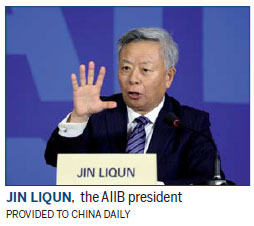AIIB chief vows to run clean, lean, green institution
Jin Liqun says oversight will be implemented without compromise
The Asian Infrastructure Investment Bank will be a 21st-century multilateral lender with a rigorous corporate culture, its first president said on Jan 17.
It will have a "lean staff" and will strive to avoid red tape, according to Jin Liqun.
Making his debut appearance as the bank's president, Jin said at a news conference that he envisions a bank that is "clean, lean and green". It will combine the merits of existing multilateral development banks and competitive private companies, he said.
"I'm committed to running the bank according to the highest possible standards and according to the principles outlined in the articles of agreement - transparency, openness, accountability and independence," he said, speaking in English.
He vowed to set a "clear division of responsibility" between the bank's board and management, saying there will be a special unit on compliance, effectiveness and integrity, which will exercise oversight of the management and report directly to the board.
To fulfill the "lean" commitment, in the first year the bank will increase its workforce only to between 100 and 150. The initial staffing level is 50.

Referring to the "clean" commitment, Jin said implementation is crucial. "It's important that you don't just have something brilliant on paper, it is important to implement it. ... As president of the bank, I will ensure that the oversight mechanism is implemented without any compromise."
He said he is planning for the first loans to be approved before the end of this year. The scale of loans in the first year will be modest - between $500 million and $1.2 billion - with energy, power, transportation, rural infrastructure, environmental protection and logistics the priorities.
The bank has been working closely with the World Bank, the Asian Development Bank and the European Bank for Reconstruction and Development to identify possible co-financing projects, Jin said. "We already have a very good project pipeline, including co-financing projects and standalone projects vetted by our own professionals. We're also open to other partners in the private sector."
But he also said that "just preparing these pipelines and making the loans" is not the most important aspect for a bank in its initial stages. It is "far more important" for the first president to set the stage by building a corporate culture that holds employees accountable.
An environmental and social framework is among the core policies in the making.
World Bank veteran Stephen F. Lintner has led the drafting of a paper on this.
Impressive CV
Jin Liqun, the AIIB president, graduated from Beijing Foreign Studies University as an English-language major before joining the Ministry of Finance and being sent to the World Bank in the 1980s as an alternate executive director for China.
He was appointed vice-minister of finance in 1998 and became vice-president of the Asian Development Bank in 2003.
In 2008, he became chairman of the board of supervisors at China Investment Corp, working closely with Lou Jiwei, the current finance minister. The two played a significant role in running the sovereign wealth fund of the world's second-largest economy with the largest foreign exchange reserves.
Jin became chairman of China International Capital Corp in 2013, entering investment banking and securities.
Fluent in English and French, he is described by his peers as "experienced, savvy and pragmatic". He is also an enthusiast of Chinese classical literature.
FAQs
Why have European and African countries joined the China-initiated AIIB?
Trade and investment opportunities in China and other Asian nations have attracted countries outside Asia to join the AIIB. Back in March. Jin Liqun, president of the new bank, said that infrastructure construction in Asia will require an annual investment of $730 billion from 2015 to 2020 and that the existing institutions were unable to meet that demand. The establishment of the AIIB provides European countries, which currently are experiencing weak economic growth, with opportunities to strengthen cooperation with Asian nations. Countries in other regions are able to benefit, too. Instead of establishing an "Asian club", the AIIB is a multilateral organization that aims to facilitate deeper economic integration in Asia and beyond.
What can Jin Liqun bring to the bank during his presidency?
Jin has rich experience in leadership and management, having worked with the government, international agencies and the private sector. He joined the Finance Ministry in 1980 and rose to the position of vice-minister in 1998. He was also a member of the State Monetary Policy Committee. Earlier in his career, Jin served as alternate executive director for China at the World Bank and at the Global Environment Facility, and was alternative governor for China at the Asian Development Bank.
Is maximizing profit the sole purpose of the AIIB?
No. As a multilateral financial institution, the bank has to ensure the profitability of investments to guarantee financial sustainability, but its focus on infrastructure means it will not aim to maximize profits. By integrating resources in Asia and other regions, the AIIB aims to enhance global cooperation.
Does China run the bank?
Founding members have the right to help define the bank's rules, including its charter, while countries that applied to join after the March 31 deadline hold voting rights but have less say in the rule-making process. The three countries with the most voting rights are China, India and Russia. China has 26.06 percent of the vote, giving the country an effective veto over major decisions. However, China has said it will not seek absolute control. As new members continue to join, the proportion of shares and voting rights will gradually be diluted.
When will the bank make its first loans?
The loans are expected to be approved before the end of 2016.
Who will receive the first loans?
China has promised not to apply for loans from the AIIB in its initial period, with priority instead given to countries with a more pressing need to upgrade their infrastructure.
























